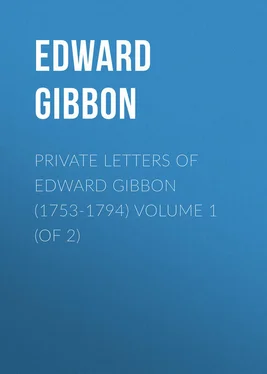Edward Gibbon - Private Letters of Edward Gibbon (1753-1794) Volume 1 (of 2)
Здесь есть возможность читать онлайн «Edward Gibbon - Private Letters of Edward Gibbon (1753-1794) Volume 1 (of 2)» — ознакомительный отрывок электронной книги совершенно бесплатно, а после прочтения отрывка купить полную версию. В некоторых случаях можно слушать аудио, скачать через торрент в формате fb2 и присутствует краткое содержание. Жанр: foreign_antique, foreign_prose, на английском языке. Описание произведения, (предисловие) а так же отзывы посетителей доступны на портале библиотеки ЛибКат.
- Название:Private Letters of Edward Gibbon (1753-1794) Volume 1 (of 2)
- Автор:
- Жанр:
- Год:неизвестен
- ISBN:нет данных
- Рейтинг книги:3 / 5. Голосов: 1
-
Избранное:Добавить в избранное
- Отзывы:
-
Ваша оценка:
- 60
- 1
- 2
- 3
- 4
- 5
Private Letters of Edward Gibbon (1753-1794) Volume 1 (of 2): краткое содержание, описание и аннотация
Предлагаем к чтению аннотацию, описание, краткое содержание или предисловие (зависит от того, что написал сам автор книги «Private Letters of Edward Gibbon (1753-1794) Volume 1 (of 2)»). Если вы не нашли необходимую информацию о книге — напишите в комментариях, мы постараемся отыскать её.
Private Letters of Edward Gibbon (1753-1794) Volume 1 (of 2) — читать онлайн ознакомительный отрывок
Ниже представлен текст книги, разбитый по страницам. Система сохранения места последней прочитанной страницы, позволяет с удобством читать онлайн бесплатно книгу «Private Letters of Edward Gibbon (1753-1794) Volume 1 (of 2)», без необходимости каждый раз заново искать на чём Вы остановились. Поставьте закладку, и сможете в любой момент перейти на страницу, на которой закончили чтение.
Интервал:
Закладка:
No sooner had the discovery of the process by which Gibbon's Autobiography had been concocted been made public, than a general desire was expressed to have the originals published in the form in which the historian left them. It was no case of incomplete or illegible manuscripts, nor of rough drafts designed only as notes for subsequent composition. The whole of the seven manuscripts are written with perfect precision; the style is in Gibbon's most elaborate manner; and each piece is perfectly ready for the printer – so far as it goes. It was impossible to do again the task of consolidation so admirably performed by Lord Sheffield. Nothing remained but to print the whole of the pieces verbatim , as the historian wrote them, not necessarily in the order of time of their apparent composition, but so as to form a consecutive narrative of the author's life.
The reader may now rest assured that, for the first time , he has before him the Autobiographic Sketches of Edward Gibbon in the exact form in which he left them at his death. The portions enclosed in dark brackets are the passages which were omitted by Lord Sheffield, and in the notes are inserted the passages or sentences, few and simple in themselves, which Lord Sheffield added to the original manuscript. For various reasons it was found impracticable to print the six sketches in parallel columns; but the admirers of the historian and all students of English literature will find abundant opportunity for collating the original texts with each other, and with the text as published by the editor, and now for a century current as one of the masterpieces of English literature.
The Letters of the historian, the bulk of which were addressed to Lord Sheffield and his family, were published in part by my grandfather in one or other of the editions of The Miscellaneous Works of Edward Gibbon . But in this collection many letters were omitted, and most of them were printed with some omissions and variations. These omissions have now been restored; and the Letters , like the other papers of our author, are now for the first time given to the world in the form in which they were composed.
I cannot pretend to any rivalry with my grandfather in the matter of the skill with which he performed the task of editing and selecting for publication the remains of his friend. But I can assure the reader that every piece contained in this volume as the work of Edward Gibbon is now printed exactly as he wrote it without suppression or emendation . And in transferring these literary treasures to the nation, and in giving them to the world, I feel that I am fulfilling the trust which the historian reposed in my grandfather, and am acting in the spirit of the lifelong friendship that bound him to my family.
I cannot conclude these prefatory remarks without acknowledging to the fullest extent the obligation I am under to Mr. Frederic Harrison for the assistance he has given me in the preparation and composition of this Preface.
EDITOR'S PREFACE
This collection of Gibbon's correspondence, extending as it does from 1753 to 1794, practically covers the whole of the historian's life, and contains his observations on society, literature, and politics during a period which includes such momentous events as the Seven Years' War, the War of American Independence, and the French Revolution.
By far the greater number of the letters now appear for the first time; but portions of the correspondence, marked in this edition with asterisks, were printed by Lord Sheffield shortly after Gibbon's death. These published portions were treated by the editor with great tact and more freedom. Lord Sheffield was giving to the world letters which discussed recent events and criticised living persons; it was, therefore, necessary for him to suppress some allusions and conceal many names. Jealous of his friend's literary reputation, he corrects errors in spelling or grammar, gives a dignified turn to the more homely phrases, and omits as trivial the petty details of domestic life. Sometimes, also, Lord Sheffield's editorial methods pass beyond the exercise of these more or less legitimate powers. In order to concentrate the interest of the correspondence, he culls a few lines from one letter, chooses a sentence from a second, extracts a passage from a third, and prints his patchwork as a genuine letter from Gibbon's own hand.
In this edition the letters are printed as they were written. For the blanks which conceal the identity of persons are substituted the real names; the suppressed passages are restored; the spelling and grammar of the original are preserved; the language is left as Gibbon wrote it. If the Memoirs give us Gibbon in the full dress of a fine gentleman of letters, the correspondence reveals to us the man as he was known to his valet and his housekeeper.
The letters have the ease and freshness of conversations with intimate friends, and, considering the character of the century in which they were written, they present one feature which deserves special notice. Only one short sentence has been omitted as too coarse to be printed. With this solitary exception, the reader knows the worst as well as the best of Gibbon, and there are scarcely a dozen phrases, scattered over 800 pages, which will offend good taste or good feeling.
The notes must speak for themselves. Though some points on which information is needed remain obscure, it is hoped that, so far as they go, they may be found useful. In their correction and revision, valuable aid has been given by Mr. G. H. Holden, Assistant Librarian at All Souls' College, Oxford.
GIBBON'S CORRESPONDENCE.
1753-1794
On June 8, 1753, Edward Gibbon, then sixteen years of age, and an undergraduate of Magdalen College, Oxford, was received into the Roman Catholic Church by a Jesuit named Baker, one of the chaplains to the Sardinian Embassy. His change of religion led to his removal from the University, and decided his father to place him under the care of M. Pavillard, a Calvinist minister at Lausanne. Escorted by M. Frey, a Swiss gentleman of Basle, Gibbon left England on June 19, 1753. His first letter announces his safe arrival.
1.
To his Father
Dear Sir,
I must beg you to excuse my not having wrote till now, but knowing that Mr. Frey had given you an account of my safe arrival by the first post, I chose to stay some time, that I might be able to give you a more exact account of my present situation. After a pretty tiresome journey of eleven days, I got safe to Lausanne. Mr. Frey, when he had delivered me into Mr. Pavilliard's hands, left the place and went to Geneva. I have now been with him a month, and during the whole time have been treated by him with the greatest civility imaginable. I read French twice every day with him. I already understand almost all that is said, and can ask for any common things I want. With regard to other things, the people here are extremely civil to strangers, and endeavour to make this town as agreeable as possible. The English here are Mr. Townshend, nephew to the present Lord Townshend, Lord Huntingtower, Mr. Crofts, and Mr. Umberstone. I have also been introduced to the Earl of Blessington, who resides here now with his family, as well as to Madame de Brissoné, to whom you gave me a letter of recommendation, and who is an extremely agreeable woman. This is the chief I have to say of the place. As to the climate, I have reason to think it will agree extremely well with me. When I was at Calais my books were seized and sent to Paris to be examined, but a friend there, whom Mr. Frey has wrote to, is to send them to Lausanne. I must beg my sincere compliments to Miss Ellison.
I am, dear Sir, With the greatest respect and sincerity, Your most obedient and most dutiful son, Edward Gibbon.2.
Интервал:
Закладка:
Похожие книги на «Private Letters of Edward Gibbon (1753-1794) Volume 1 (of 2)»
Представляем Вашему вниманию похожие книги на «Private Letters of Edward Gibbon (1753-1794) Volume 1 (of 2)» списком для выбора. Мы отобрали схожую по названию и смыслу литературу в надежде предоставить читателям больше вариантов отыскать новые, интересные, ещё непрочитанные произведения.
Обсуждение, отзывы о книге «Private Letters of Edward Gibbon (1753-1794) Volume 1 (of 2)» и просто собственные мнения читателей. Оставьте ваши комментарии, напишите, что Вы думаете о произведении, его смысле или главных героях. Укажите что конкретно понравилось, а что нет, и почему Вы так считаете.












